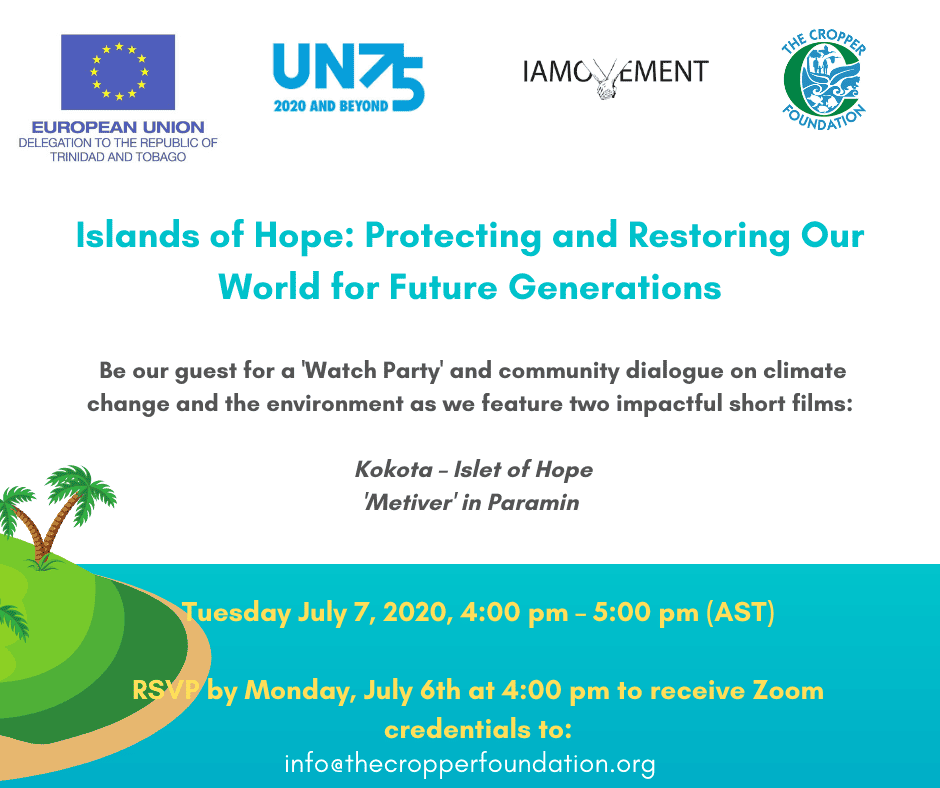On Kokota, a small island in the Indian Ocean off the coast of Tanzania, the villagers live pretty much the way they did 100 years ago. But the island faced an existential crisis from climate change, overfishing, deforestation and water scarcity, which threatened the lives and livelihoods of inhabitants. In the hills of Paramin, farmers faced an existential threat of their own; indiscriminate cutting of the hillside for roads and farmland that led to severe landslides that also threatened homes and livelihoods.
These two stories are the focus of two short documentary films, Kokota – Islet of Hope and ‘Metiver in Paramin’. But while the devastating impact of human activity on the environment was a common thread of both, it was not the films’ main focus. Instead, both effectively highlighted the way in which community effort and simple actions could be used to overcome years of neglect and destruction.
It was for this reason that a virtual Watch Party was organized by the European Union in cooperation with IAMovement, The Cropper Foundation and the United Nations. As the world battles the COVID-19 pandemic and its economic impact, it is important to focus on sustainable recovery in the global push towards mitigating the climate crisis and global warming.

The story of Kokota effectively demonstrates that ignoring climate and environmental degradation while working to save the economy would be short sighted; and furthermore, that continued climate and environmental action can be closely tied to economic success and improved livelihoods. Healthy natural ecosystems (terrestrial and marine) are a prerequisite for continued prosperity, where unaddressed climate change and environmental degradation have now been strongly linked to greater natural catastrophes, including the expected effects of making large parts of our planet uninhabitable in the coming decades.
“Metiver” in Paramin showcased a project led by members of IAMovement which was implemented through the UNDP GEF Small Grants Programme in 2016-2017 to tackle the issue of landslides in Trinidad’s largest hillside farming community with vetiver grass. It demonstrated that simple, easily available, green and inexpensive solutions can play a role in averting a crisis.
Small Islands Development States (SIDS) are disproportionately affected by climate change, and dialogue on how to achieve sustainable development and mitigate and adapt to climate change for these countries is critical. Trinidad, and especially Tobago, for example, is under attack from coastal erosion and rising sea levels. Solutions considered in larger countries, such as moving people away from the coastlines, are not realistic options for SIDS which depend and rely on coastlines for much of their livelihoods.
Recognizing that there is a need for change is a first step. It is no longer acceptable to think about economic development as separate and apart from environmental conservation. Climate change priorities need to be integrated into development approaches and national policies – and for their successful implementation, cross-sector engagement and collaboration are key. Consumers and producers need to be mindful of products that are offered on the market, looking at it from the full product lifecycle “cradle-to-cradle” point of view. City development needs to take place with social and environmental sustainability in mind; infrastructure development and environmental preservation need to go hand in hand and the green transition must and certainly can be linked with job creation, food security, protection of biodiversity and public health, offering ample opportunities for economic development.
So while it is the case that COVID-19 is having a devastating impact on our lives and on economies around the globe and that containing the virus and saving lives must be the focus of our immediate efforts, we ought to take the opportunity now, as we chart our pathway forward, to acknowledge other pending crises which pose equal or even greater threats; namely: climate change, terrestrial and marine biodiversity loss, excessive use of resources and pollution on land and at sea. These are also existential and global emergencies that cannot be ignored. This is a unique moment in mankind’s history where we are forced to halt business as usual and reconcile for the best pathways forward, it is important that we do not just build back, but that we “build back better”.
With the developing knowledge that changing weather patterns and ecosystem degradation increase the risk of infectious diseases around the world, and that some of these may have pandemic potential, there should be consideration for the human and economic cost which could arise from not taking action on climate and biodiversity protection now. The post-COVID economic recovery and the transition to a sustainable, socially just, resilient and climate neutral economy can and should go hand in hand.
July is climate month for the EU Delegation. Following the successful Watch Party and community dialogue, it is the Delegation’s intention to continue the dialogue in a number of fora – including via social media – and culminating with a final high level dialogue on July 30th. Follow on our FB page at: https://www.facebook.com/EUinTandT/ for more on the campaign.







